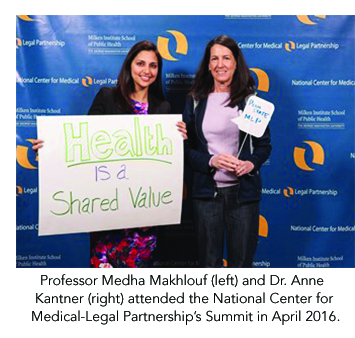Medical-Legal Partnership Clinic Background
The Medical-Legal Partnership Clinic at Penn State Dickinson Law was founded in 2016 and is based on a model that has been adopted by more than 450 health care institutions. The National Center for Medical-Legal Partnership (NCMLP) supports the development of MLPs by hosting conferences and webinars, providing technical advice, and serving as a clearinghouse for research on MLPs.
 The initial iteration of the Clinic was a one-year pilot project co-led by Professor Medha D. Makhlouf and Penn State College of Medicine faculty member and Penn State Health physician Anne Kantner. The Clinic received referrals of a variety of unmet civil legal needs from staff of a Penn State Health Medical Group practice in Harrisburg. Students participated in weekly “office hours” onsite at the medical clinic, during which they met with newly referred patients and established clients. Law students had opportunities to shadow health care providers, attend provider meetings concerning operational issues, and train medical residents on health-harming legal issues. The Clinic represented patients in matters relating to advance health care directives, housing, domestic violence, medical bills, immigration, education, energy insecurity, and public benefits.
The initial iteration of the Clinic was a one-year pilot project co-led by Professor Medha D. Makhlouf and Penn State College of Medicine faculty member and Penn State Health physician Anne Kantner. The Clinic received referrals of a variety of unmet civil legal needs from staff of a Penn State Health Medical Group practice in Harrisburg. Students participated in weekly “office hours” onsite at the medical clinic, during which they met with newly referred patients and established clients. Law students had opportunities to shadow health care providers, attend provider meetings concerning operational issues, and train medical residents on health-harming legal issues. The Clinic represented patients in matters relating to advance health care directives, housing, domestic violence, medical bills, immigration, education, energy insecurity, and public benefits.
In subsequent years, the MLP Clinic evolved to expand the number of health care partners from which it accepts referrals and narrow its scope of practice. The Clinic is known for its expertise in immigrant access to public benefits. It has partnered with MidPenn Legal Services to expand the number of patients and types of matters it can take on. It has worked with organizations such as the Community Justice Project, the Pennsylvania Health Law Project, and Community Legal Services to advocate for policies that support immigrants’ access to health-supporting public benefits and to provide training to legal advocates on this topic. It has also partnered with the International Health Care Professionals Program, based in Lancaster, Pennsylvania, to provide community education on the naturalization process.
During the 2020-2021 academic year, the MLP Clinic operated fully remotely due to the COVID-19 pandemic, continuing to represent community members in need even though students were scattered across the country. In response to this experience, Professor Makhlouf invited four other professors directing MLP Clinics to co-author an article titled “Setting the Health Justice Agenda: Addressing Health Inequity & Injustice in the Post-Pandemic Clinic.”